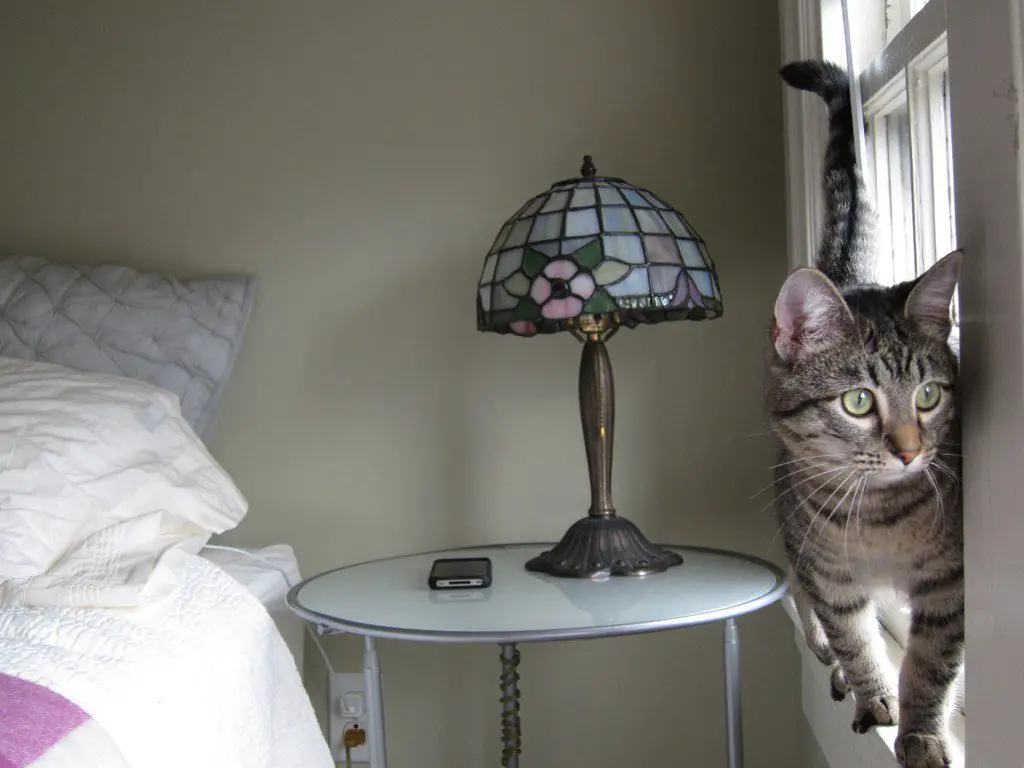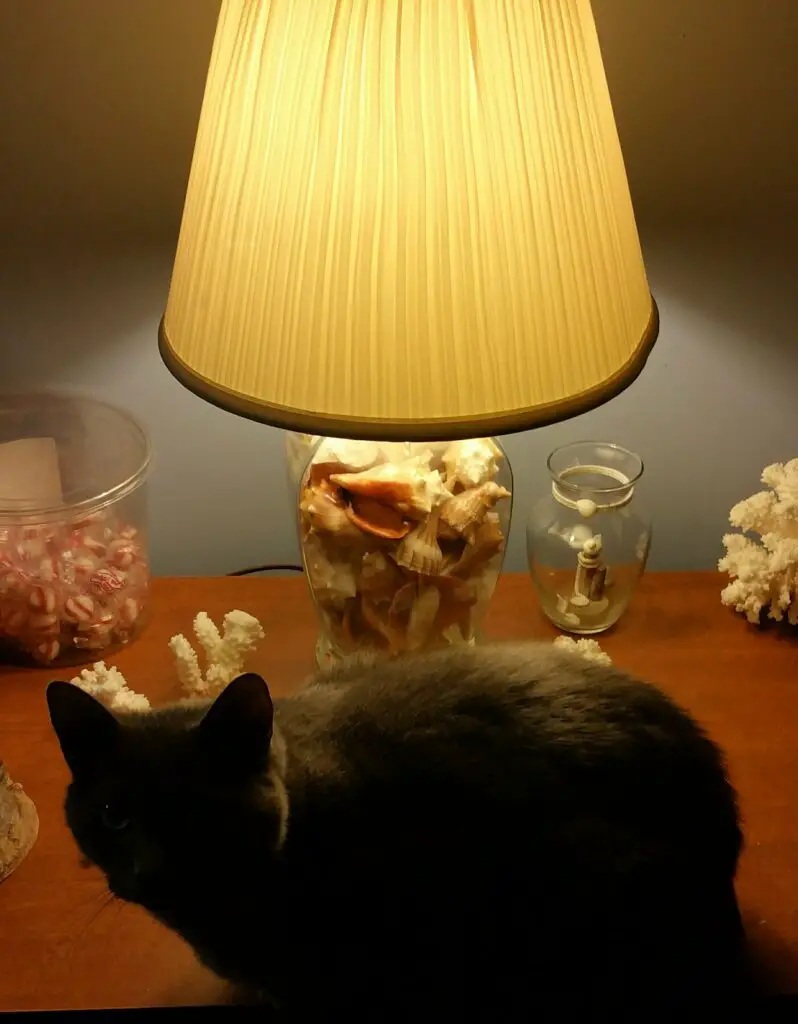Cats are naturally curious creatures, often exhibiting behaviors that can be perplexing, and sometimes frustrating, to their human companions.
One such behavior is the habit some cats develop of tipping over bedside lamps during the night.
- Key Takeaway
- Why Is a Cat Tipping Over Bedside Lamp During The Night?
- Why Is My Cat Obsessed With The Lamp?
- What Can I Do To Stop My Cat From Tipping Over The Lamp?
- How Can I Prevent My Cat From Waking Me Up By Tipping Over The Lamp?
- Could A Cat Hurt Itself With The Lamp?
- FAQs
- Q: Why do cats like to knock things off tables and shelves?
- Q: Is there any way to cat-proof my bedroom?
- Q: My cat meows loudly at night. How can I make it stop?
- Q: How can I keep my cat from waking me up in the middle of the night?
- Q: My cat is knocking over the lamp despite all my efforts. What should I do?
- Q: My cat is an older cat and has started knocking things over recently. What could be the reason?
- Q: Why does my cat knock over the lamp only at night and not during the day?
- In Conclusion
Key Takeaway
- Cats may tip over bedside lamps during the night due to their natural curiosity, nocturnal activity, attraction to the light or warmth of the lamp, or while trying to get your attention.
- To prevent your cat from tipping over the lamp, consider securing the lamp with double-sided tape or Museum Wax, placing it out of the cat’s reach, or providing alternative forms of entertainment for your cat during the night.
Why Is a Cat Tipping Over Bedside Lamp During The Night?

A cat might tip over a bedside lamp during the night due to its natural curiosity and nocturnal behavior. It could be attracted to the light or warmth of the lamp, or it might be trying to get your attention.
cats are nocturnal creatures and are often more active at night, so they may knock over lamps during playtime or while trying to get your attention.
Another factor could be that the lamp is placed in a spot that your cat usually jumps onto or walks by, increasing the likelihood of it being knocked over.
To prevent this, you can secure the lamp using double-sided tape, Museum Wax, or by bolting it down.
You might also consider providing alternative forms of entertainment for your cat during the night to keep them distracted.
Why Is My Cat Obsessed With The Lamp?

Cats can develop an obsession with lamps because the warmth that lamps give off can be comforting to them, much like how they enjoy basking in the sun.
They may also be attracted to the light and shadows created by the lamp, which can stimulate their hunting instincts.
Furthermore, cats are naturally curious and playful creatures, and they might see the lamp as a potential toy.
However, in some cases, this behavior might be a way for your cat to get your attention.
If your cat is tipping over lamps or exhibiting other disruptive behaviors, it could be a sign that they need more stimulation or interaction.
It’s important to provide your cat with alternative forms of entertainment, such as toys or puzzle feeders, to divert their attention away from the lamps.
What Can I Do To Stop My Cat From Tipping Over The Lamp?
- Step 1: Provide Alternative Forms of Entertainment
- Step 2: Create a Safe Space
- Step 3: Secure the Lamp
- Step 4: Use Cat Repellents
- Step 5: Consult a Veterinarian
Step 1: Provide Alternative Forms of Entertainment
To divert your cat’s attention from the lamp, provide them with a variety of toys or puzzle feeders. These can keep your cat mentally stimulated and physically active, reducing their interest in the lamp.
Step 2: Create a Safe Space
Ensure your cat has a comfortable, warm place to rest that isn’t near any lamps. This could be a heated cat bed or a cozy blanket in a sunny spot.
Step 3: Secure the Lamp
Consider securing your lamp to the table using adhesive strips or a heavier base. This can make it harder for your cat to knock it over.
Step 4: Use Cat Repellents
There are certain scents that cats dislike, such as citrus or menthol. Spraying these on or around your lamp might deter your cat from approaching it.
Step 5: Consult a Veterinarian
If your cat continues to obsess over the lamp despite your efforts, it may be worth discussing the behavior with a veterinarian. They can provide additional strategies or check if there’s an underlying health issue causing the behavior.
How Can I Prevent My Cat From Waking Me Up By Tipping Over The Lamp?
- Bolt or Nail Your Lamps Down: You could bolt or nail them down to make it harder for your cat to knock them over.
- Use Sticky Tape: Cats dislike the sticky sensation on their paws, so this can deter them from approaching the lamp.
- Add Weight to the Lamp Base: This could be a useful strategy if your cat is particularly strong or determined.
- Use Museum Putty: You roll it in your fingers until soft, apply it to the base of the object, and then press the object to the surface.
- Create Diversions: This could include toys, scratching posts, or interactive feeders.
- Regular Grooming: Regular nail clipping as part of a cat-proof design strategy. If your cat’s nails are kept short and neat, they may be less likely to scratch at or knock over items.
Could A Cat Hurt Itself With The Lamp?
Yes, a cat can potentially hurt itself with a lamp. While modern LED bulbs are generally safe, a cat playing rough with a lamp might get injured, especially if the lamp has sharp edges.
Furthermore, cats can experience electrical injuries from biting or chewing wires. Another potential risk comes from lamps with certain types of bulbs or decorations.
For instance, a cat might lick a salt lamp out of curiosity, which can lead to poisoning.
Moreover, if a lamp is knocked over and breaks, it could create sharp fragments that could injure the cat.
FAQs
Q: Why do cats like to knock things off tables and shelves?
A: Cats have a natural instinct to explore, hunt, and play. Knocking things off tables and shelves can be a way for them to engage in this behavior. It can also be a way for them to get your attention or assert their territory.
Q: Is there any way to cat-proof my bedroom?
A: Yes, there are several steps you can take to cat-proof your bedroom. You can remove any fragile or valuable items that your cat might be tempted to knock over. Keep the door closed when you’re not in the room to prevent your cat from entering. Providing your cat with plenty of toys, scratching posts, and playtime outside of the bedroom can also help prevent destructive behavior.
Q: My cat meows loudly at night. How can I make it stop?
A: Loud nighttime meowing can be a sign that your cat is seeking attention or is anxious. Make sure that your cat’s basic needs are met by providing food, water, and a clean litter box. Engage in interactive playtime with your cat before bedtime to tire them out. If the meowing continues, it’s recommended to consult with a veterinarian or a cat behavior expert to rule out any underlying health or behavioral issues.
Q: How can I keep my cat from waking me up in the middle of the night?
A: Establishing a bedtime routine for your cat can help signal that it’s time to sleep. Make sure your cat has a comfortable sleeping area, away from any distractions or sources of excitement. Engaging in playtime and feeding your cat right before bed can also help tire them out and encourage a longer period of sleep.
Q: My cat is knocking over the lamp despite all my efforts. What should I do?
A: If your cat continues to knock over the lamp despite your attempts to prevent it, it may be beneficial to consult with a veterinarian or a cat behavior specialist. They can provide personalized advice and strategies to address your specific situation.
Q: My cat is an older cat and has started knocking things over recently. What could be the reason?
A: Changes in behavior, such as knocking things over, in older cats can be a sign of underlying health issues, cognitive decline, or stress. It’s recommended to schedule a veterinary check-up to rule out any medical causes and discuss potential solutions with your veterinarian.
Q: Why does my cat knock over the lamp only at night and not during the day?
A: Cats are crepuscular animals, which means they are most active during dawn and dusk. The nighttime activity may be due to their natural hunting instincts or a desire for attention. Providing your cat with enough mental and physical stimulation during the day can help decrease nighttime activity.
In Conclusion
In conclusion, if your cat is tipping over bedside lamps during the night, it’s likely due to their active nocturnal nature and curiosity.
They might be seeking your attention, trying to play with the lamp as a toy, or exploring their surroundings.
It’s essential to address this behavior not only for your peace of mind but also for your cat’s safety.
Providing them with alternative forms of entertainment, such as engaging toys or puzzle feeders, can divert their attention away from the lamps.





Leave a Reply